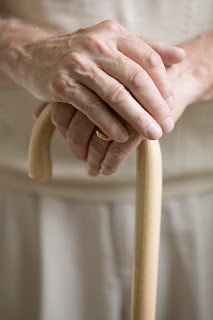 “The great thing about getting older is that you don't lose all the other ages you've been.” - Madeleine L'Engle
“The great thing about getting older is that you don't lose all the other ages you've been.” - Madeleine L'Engle
This past week, one of my classes featured a guest speaker, Dr. Michael Cheang, who is an expert in the field of aging and gerontology. While he certainly could have used his time to deliver a scholarly lecture or powerpoint slide show full of data, Dr. Cheang chose to engage the class with a series of interactive role-playing activities to help us future social workers understand some of the challenges faced by the elderly, often due the ignorance of their own family members.
When I hear the term “elder abuse,” my mind immediately jumps to images of negligent nursing aides in a care home who fail to take proper care of Grandpa or sinister con artists who steal Grandma’s identity over the phone. Interestingly enough, it’s actually the people who are closest to you who are most likely to be guilty of elder abuse, not unlike domestic abuse and violent crime. I was astonished to realize how often families make life-changing decisions for an elderly parent without even asking the parent for permission or taking the time to find out how they feel about the change. In the rush to "fix" the situation, it seems everyone forgets to ask the elderly what they want.
Too often, assumptions are made about medical conditions, nursing homes and end of life decisions that are based more on fear than fact. If a teenager loses his glasses, we conclude that he is irresponsible. If 45-year-old can’t find his glasses, we reckon he must be very busy. But if a 70-year-old loses his glasses, the best explanation is that he’s probably senile. We assume that being forgetful is the same thing as memory loss. But it’s not. We assume that since Grandma can no longer drive or hear the phone ring, she needs to be placed in a nursing home. But she doesn’t. We assume that Grandpa wants a feeding tube to prolong his life. But he doesn’t. This is no way to treat our kupuna.
Instead of viewing the elderly as a population that can offer wisdom, perspective and sense of humor, we unfairly characterize them as out of touch, unattractive and objects of ridicule. “Humorous” stereotypes of grumpy and clueless grannies from movies and TV commercials haven’t helped either. Young is good. Old is bad. Wrinkles and silver hair are seen as flaws that have to be minimized or concealed, especially for women, who are expected to look a certain way in order to be taken seriously.
Our society is afraid of aging.
If this is true, we won't be able to hide from our fears much longer. By the time I retire, the life expectancy in this country is projected to be at 85 years or more. One out of every five Americans will be over 65. Close to one-third of the lifespan will be spent post-retirement. The number of elders who are 85 and older could quadruple over the next 50 years. These dramatic demographic shifts will certainly create daunting challenges: soaring medical costs and demand for long-term care, heavier tax burdens on the workforce, caregiver shortages and the depletion of Social Security. At the same time, my hope is that these realities will also force us to acknowledge, respect and value our elders, whose dignity and wisdom are assets to society, not liabilities. One of the most memorable parts of Dr. Cheang’s presentation was when everyone in the class was asked to create a list of 5 simple pleasures they currently enjoy as part of their routine: brewing coffee every morning, reading the paper, sitting in a favorite chair, playing with a pet, gardening on the weekends, etc. If you must know, mine were 1) checking sports box scores and recaps online, 2) listening to NPR in the car, 3) eating jello before bedtime, 4) reading scattered chapters of unfinished nonfiction books and 5) watching Jeopardy on the days I make it home in time. These are the simple pleasures I take for granted.
One of the most memorable parts of Dr. Cheang’s presentation was when everyone in the class was asked to create a list of 5 simple pleasures they currently enjoy as part of their routine: brewing coffee every morning, reading the paper, sitting in a favorite chair, playing with a pet, gardening on the weekends, etc. If you must know, mine were 1) checking sports box scores and recaps online, 2) listening to NPR in the car, 3) eating jello before bedtime, 4) reading scattered chapters of unfinished nonfiction books and 5) watching Jeopardy on the days I make it home in time. These are the simple pleasures I take for granted.
Once everyone had written a personal list, Dr. Cheang instructed us to cross out the first three things from it. He informed us that a day will come when we will no longer be able to enjoy these things in our old age. Moans and groans erupted from all corners of the classroom. What??!! No more internet access, NPR or jello? It’s difficult to imagine survival without these necessities, but this is what happens to the elderly as many of their most treasured activities are taken from them. It should not be a surprise that elderly folks actually want the exact same things that are valued by the rest of us. Dignity. Respect. Companionship. A sense of home. The freedom to make independent choices.
And of course, the ability to enjoy life's simple pleasures.
January 29, 2009
Simple Pleasures: Some Thoughts on Growing Old
Subscribe to:
Post Comments (Atom)
No comments:
Post a Comment